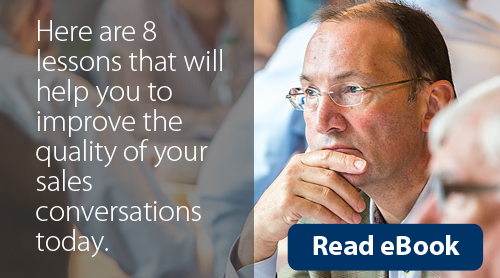
Why did the customer choose company A over companies B or C?
Is the way you sell leading you to the same place every time?
How many times have you reached the final stage of the sales process only to find out there are more hoops to jump through?
For example, they want a reference from someone who's in their exact same industry, the exact same size, with 100% satisfaction over the past two and a half years and they only pay a few thousand pounds a month.
You're think, "Wow, I don't have anyone like that. I'm finished." Right? You don't call them back. You walk away. Or, you make something up.
And, by the way, people are getting pretty fed up with giving references too.
What if we stopped getting to that point, by instead of having the "why me?" discussion, have a "why overall?" discussion. This article is an edited excerpt from our New eBook ”8 Lessons to Master About Asking Sales Questions”
What we need to try and do is get someone to talk about every aspect buying.
And it is complicated. Don't fool yourself. "People will say, " sales is easy." It's not easy. You've got to talk about a lot of elements. You've got a lot of stuff to talk about, and if you miss any one of those things, you're probably going to have a weaker case than if you had covered every one of those things.
This it what happens. The prospect says: "I want a delivery service." You say: "Okay. Let's talk about your deliveries."
We spend the next hour talking about the delivery service. In the course of doing that, I have not talked about warehousing, I have not talked about customer service, I have not talked about labeling, I have not talked about driver training, I have not talked about how many other things? The list goes on.
Now, as a result, they see you just a delivery service, because that's all your conversation was about. And that may not be your strength. Your strength might be somewhere else, so we just wasted an hour.
If we can take them back to the "why" discussion and build that up a little bit and say: "You know, I'm just curious, when companies come to me and they want to talk about deliveries, there's usually a conversation that's happened internally that's prompted them to say we need to fix our deliveries. Tell me about that conversation."
Now what am I going to learn from that? All kinds of stuff.
- What the goal is.
- What they're trying to accomplish.
- The bigger problems they are trying to fix.
- Who is involved in fixing it
Rather than getting sucked into the deliveries discussion, you can say, "Often when I’m talking to business owners, if they're concerned about growth, they're probably worried about the whole logistics service provision. Tell me about how you handle that?"
Bingo!
Now, when the next sales person comes in from your competitor, and the buyer says, "I want to talk to you about my deliveries," and they say, "Okay. Well, let's talk about your deliveries," they haven't talked about all those things you've talked about.
What's the difference? They don't know about those things? No. It's the discussion – they didn’t cover it.
I've got them to talk about why.
I've got them to go back deeper than just "I want deliveries." Why do you want a new delivery service? Why do you want to do that? Why do you want to change your logistics? What is the purpose? You have to go back.
If you are in a "why me?" conversation, here's how the decision goes.
It's called the Excel decision. That does not mean that you excel. It means that on an Excel spreadsheet, you are listed with the other potential suppliers. They collect rankings and mark them in each column beside your name. The last column is their favourite of course – price.
If you all look equal on a spreadsheet, who do they go with? Lowest price.
Wouldn't you? It's an Excel decision. We never look at our best in the world of Excel. That's not where we like to play. If you're showing up in Excel when people are making the decision, you're doing something wrong.
Download our New eBook and read the full story.
Our gift to you...
Apply now for your personal leadership consultation with a Vistage Chair. They'll help you assess areas of strength of your business and identify areas of potential growth.


